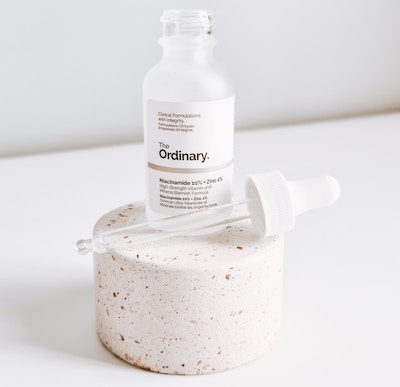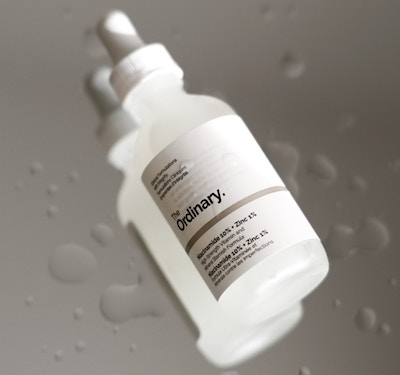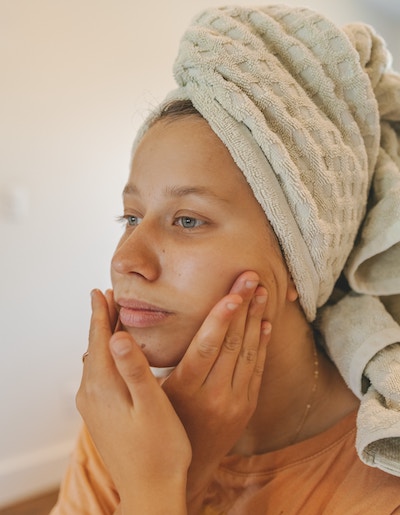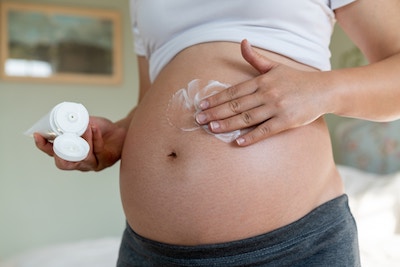Lots of us moms experience a whirlwind of emotions and concerns during pregnancy and breastfeeding, especially when it comes to choosing safe skincare products.
One ingredient that often raises questions is niacinamide. If you find yourself wondering whether niacinamide is safe to use during breastfeeding, I’m here to address those concerns.
I will also share with you my tips for incorporating niacinamide into your skincare routine in the safe way.

Niacinamide, a form of vitamin B3, offers many advantages for pregnant and breastfeeding women. It assists in regulating oil production, making it a valuable ally in combating pregnancy-related acne.
It reduces inflammation and calms sensitive skin, which is often exacerbated during this transformative period. It even promotes the synthesis of collagen, helping to maintain skin elasticity – and you probably already know how much work your skin did during pregnancy with all that stretching!
Would you like to know how to use niacinamide safely while breastfeeding? Keep on reading for all you need to know to feel confident about your skincare during breastfeeding.
This article is not a substitute for medical advice.
What Is Niacinamide & What Are Its Benefits
Niacinamide, also known as nicotinamide, is an essential nutrient that can be found in food and dietary supplements. It is a form of vitamin B3 that plays a crucial role in maintaining the health of our skin, digestive system, and nervous system.
When it comes to skincare, niacinamide has been shown to have numerous benefits1, including treating acne, reducing inflammation, and keeping the skin hydrated.
It works by improving the skin’s barrier function, which can help protect the skin from irritants and pollutants that can cause skin issues. Additionally, it has anti-inflammatory properties that can soothe irritated skin and reduce redness.
You can read more about niacinamide benefits & how long does it take for niacinamide to work in this article.
Niacinamide is suitable for all skin types2, including sensitive skin. It is recommended for women who are pregnant or nursing, as it is considered safe to use during pregnancy and breastfeeding.
It can be particularly beneficial for those who are experiencing skin conditions such as acne or eczema, as it can help improve the overall health of the skin. So, if you’re looking for an ingredient that can help keep your skin healthy and glowing, niacinamide is definitely worth considering.
Does Niacinamide Have Any Side Effects?
Niacinamide is non-toxic and non-irritating, making it an excellent choice for people with sensitive or irritated skin. It is generally well-tolerated and safe for most people, including pregnant and breastfeeding women.
Some people may experience minor side effects3, such as mild irritation, redness, or dryness, but these are usually temporary and go away once the skin adjusts to the product.
As with any skincare ingredient or supplement, there is always the possibility of side effects. It’s always best to consult with your healthcare provider or a dermatologist to determine whether niacinamide is suitable for your skin type and any skin issues you may be experiencing.

Is It Safe To Use Niacinamide During Pregnancy?
During pregnancy, the body goes through tremendous changes, and the skin is no exception. As an expecting mother, you may encounter various skincare issues popping up throughout your journey.
You’ve heard of the phrase “eating for two”, but at this point, you may begin to wonder if you also have to think about not just what you put into your body, but what you put on your body.
As a topical ingredient (meaning it’s applied onto the surface of the skin), niacinamide is not known to have adverse effects when it’s applied.
Some medicines are absorbed through the skin and quickly into the bloodstream because of certain factors such as suitable pH, fast absorbance into the bloodstream.
Niacinamide is not easily absorbed through the skin4 and into the bloodstream in significant amounts. That means it stays on the skin, outside of your body, and away from your baby. This reduces any potential risks. According to skincare experts and medical professionals niacinamide is generally safe during pregnancy.
In addition, it’s not a toxic substance to begin with5. Oral medications containing niacinamide have been used for various conditions during pregnancy without reported issues.
It’s important to note that each person and each pregnancy is unique, so consulting with your healthcare provider or dermatologist is always recommended to address any specific concerns you may have.
If you’re thinking about adding niacinamide into your routine, here are some common skin issues it can help treat:
- Uneven skin tone: Pregnancy hormones can cause hyperpigmentation and melasma. Niacinamide has brightening properties that can help even out the skin tone.
- Acne-prone skin: Hormonal fluctuations during pregnancy often lead to acne breakouts. Niacinamide regulates oil production, minimizes pore appearance, and reduces inflammation, making it beneficial for managing acne-prone skin.
- Collagen production: Pregnancy can affect collagen levels, resulting in loss of elasticity, stretch marks and fine lines. Niacinamide promotes collagen production, enhancing skin firmness and reducing signs of aging and stretch marks
- Dark spots: Niacinamide’s ability to lighten dark spots and pigmentation makes it useful for addressing pregnancy-related discoloration.
Is Niacinamide Safe For Acne During Pregnancy?
Yes, niacinamide is generally considered safe to use for treating acne during pregnancy. It can be an effective solution for managing acne breakouts while expecting. Niacinamide helps regulate oil production, reduce inflammation, and minimize pore appearance, making it beneficial for acne-prone skin.
Unlike certain over-the-counter products containing ingredients like glycolic acid, salicylic acid, or benzoyl peroxide, which may carry potential risks during pregnancy, niacinamide is a topical ingredient that is unlikely to pose harm.
It works locally on the skin without significant absorption into the bloodstream. This reduces the risk of any potential adverse effects on the developing fetus, including the risk of birth defects.
Niacinamide is a safe alternative that supports skin health and provides the added benefit of being a form of vitamin B, contributing to overall skin vitality.
Can I Use Niacinamide While Breastfeeding?
If you’re a breastfeeding mother and considering the use of niacinamide topically, you’ll be relieved to know that it is considered safe during this stage as well. So to answer your questions: yes, you can use niacinamide while breastfeeding.
Niacinamide, when applied on the skin, does not cross into breast milk or pose any risk to your baby. By incorporating niacinamide into your skincare routine, you can continue to nourish and care for your skin while providing a safe environment for your breastfeeding journey.
Since niacinamide is a topical ingredient, it does not have systemic effects on your body or your breast milk composition. However, it’s always a good idea to check the other ingredients in skincare products to ensure they are also safe to use while breastfeeding.

Reasons To Use Niacinamide As Breastfeeding Woman
Here are some common skin concerns experienced by breastfeeding mothers and how niacinamide can help address them:
- Dry skin: Breastfeeding can cause dehydration, leading to dry skin. Niacinamide helps retain moisture, keeping the skin hydrated and preventing dryness.
- Postpartum acne: Hormonal fluctuations during postpartum can trigger acne breakouts (or you may still be fighting with leftovers of pregnancy acne). Niacinamide regulates oil production, reduces inflammation, and minimizes pore appearance, making it beneficial for managing both pregnancy and postpartum acne.
- Skin discoloration: Hormonal changes during pregnancy and breastfeeding can leave you with some skin discoloration. Niacinamide has brightening properties that can help even out skin tone and lighten dark spots.
- Anti-aging effects: Breastfeeding and sleep deprivation can accelerate the aging process. Niacinamide promotes collagen production, improving skin elasticity and reducing the appearance of fine lines and wrinkles.
- Irritated skin: Breastfeeding can sometimes cause skin sensitivity and irritation. Niacinamide’s anti-inflammatory properties can help soothe and calm irritated skin.
- Strengthening the skin barrier: Breastfeeding may compromise the skin barrier, making it more susceptible to environmental stressors. Niacinamide supports the skin barrier function, protecting it against pollutants and maintaining overall skin health.
By incorporating niacinamide into your skincare routine, you can address these specific dermatological concerns and maintain radiant skin while breastfeeding.
Does Niacinamide Pass Through Breast Milk?
The research on whether niacinamide can pass into breastmilk after being applied to the skin is limited. However, the available evidence suggests that the amount of niacinamide transferred to breastmilk is very low6 and unlikely to cause any harm to your baby.
Niacinamide is mostly absorbed and used by the skin, with only a small amount entering the bloodstream. This suggests that the amount of niacinamide available to be transferred into breastmilk would be extremely low.
There have been no reports of negative effects on breastfed babies from mothers using niacinamide topically. While more research is needed, it appears that the risk of your baby being exposed to niacinamide through breastfeeding is minimal.
As always, if you have any concerns or questions, it’s best to talk to your healthcare provider for personalized advice.

Safety Tips For Applying Niacinamide
- Patch test: Before applying the product you’re going to use, perform a patch test on a small area of skin to check for any adverse reactions.
- Hydrate your skin: Niacinamide works best on well-hydrated skin, so consider using a moisturizer with ingredients like hyaluronic acid before applying niacinamide.
- Gentle application: Apply with a light touch, especially if you have sensitive or irritated skin, to minimize any potential irritation.
- Sun protection: Niacinamide can help protect your skin from UV damage, but it’s still essential to use sunscreen to safeguard against skin cancer and maintain a healthy complexion.
- Incorporate into your skincare routine: Use it consistently in your daily skincare routine for best results in treating acne, improving skin tone, and other concerns.
- Baby’s skin: If you’re breastfeeding, be cautious when applying on areas that come into direct contact with your baby’s skin (or areas that your baby can lick) to prevent any potential transfer or sensitivity.
Can I Use The Ordinary Niacinamide Serum When Breastfeeding?
When it comes to “The Ordinary” brand and their Niacinamide Serum, you can rest assured that they prioritize safety without compromising on effectiveness.
Many brands don’t list concentration or strengths of ingredients, but what sets “The Ordinary” apart is their commitment to transparency and providing clear information about the ingredients they use.
Their Niacinamide Serum contains a 10% concentration of niacinamide, which falls within the recommended range for topical use7.
The brand is known for its meticulous selection of ingredients and stringent quality standards. They steer clear of harmful additives, fragrances, and common irritants, ensuring that their products are suitable for various skin types, including breastfeeding mothers.
Can I Use Azelaic Acid And Niacinamide While Breastfeeding?
The combination of azelaic acid and niacinamide can be a powerful duo in your breastfeeding skincare routine. Azelaic acid is known for its ability to reduce redness and blemishes, while niacinamide helps regulate oil production and improve skin texture.
Together, they can address multiple skin concerns, such as acne and post-inflammatory hyperpigmentation.
Both ingredients are considered safe for topical use8 during breastfeeding and are unlikely to be absorbed into the bloodstream in significant amounts.
However, as every individual’s skin is unique, it’s always a good idea to do a patch test first and consult with a healthcare professional or dermatologist if you have any specific concerns.

Breastfeeding-Safe Skincare Ingredients
Introducing a list of breastfeeding-safe skincare ingredients that cater to the needs of pregnant and breastfeeding women, ensuring both their beauty and baby’s safety:
- Vitamin C Serum: A powerful antioxidant that brightens the skin and promotes collagen synthesis, while being safe for use during pregnancy and breastfeeding.
- Alpha Hydroxy Acids (AHAs): Gentle exfoliants like glycolic and lactic acid, which can improve skin texture and tone without adverse effects during pregnancy and breastfeeding.
- Hyaluronic Acid: This powerful ingredient can help with wrinkles and provide proper hydration (which is super important because dry skin is very common during and after pregnancy). According to experts, it’s perfectly fine to use hyaluronic acid while pregnant and breastfeeding.
What Skincare Ingredients To Avoid When Breastfeeding?
As a breastfeeding mother, it’s important to be aware of skincare ingredients that may not be suitable during this special time, prioritizing both your well-being and your baby’s health.
Skincare ingredients to avoid while breastfeeding:
- Retinoids: These vitamin A derivatives, including retinol and tretinoin, are best avoided due to limited research on their safety during breastfeeding. Retinol is considered unsafe during pregnancy and breastfeeding.
- Hydroquinone: This skin-lightening ingredient should be avoided, as its effects on breastfeeding infants are not well understood.
- Chemical sunscreens: Certain chemical filters like oxybenzone and avobenzone may potentially pass into breast milk, so it’s advisable to opt for physical sunscreens with ingredients like zinc oxide and titanium dioxide.
- High-dose essential oils: Concentrated essential oils, particularly when used in large amounts, may have unknown effects on breastfeeding infants.
Should You Change Your Skincare While Breastfeeding?
For all you fabulous breastfeeding moms out there who are wondering whether to switch up your skincare routine, remember that prioritizing both your skin’s health and your baby’s well-being is key.
That’s why you may need to change your beauty regimen and skincare products you use, while breastfeeding – to ensure the are no harmful ingredients that could pass through milk.
Thankfully, you don’t need to worry about using niacinamide. It’s safe for pregnant women and breastfeeding moms.
Niacinamide can be a valuable addition to your carefully curated skincare regimen. With its breastfeeding-safe properties, it’s also a good choice if you’re looking for moisturizing serum or cream, offering gentle brightening effect.
Remember, you deserve to feel fabulous inside and out, mama!
The purpose of this article is informative. It’s not a substitute for professional medical advice or medical care. Remember: safety first! Consult your doctor/pediatrician in case of any doubts. The author of this article does not accept any responsibility for any liability, loss or risk, personal or otherwise, incurred as a consequence, directly or indirectly, from any information or advice contained here.
Resources:
https://www.researchgate.net/
https://www.webmd.com/
https://pubmed.ncbi.nlm.nih.gov/
https://www.ncbi.nlm.nih.gov/
https://mhnpjournal.biomedcentral.com/

